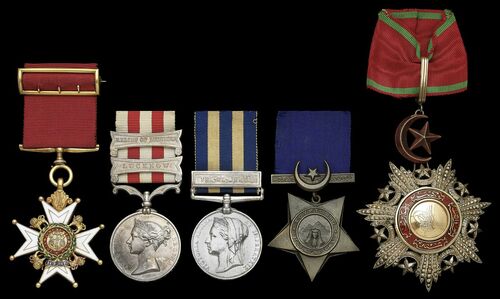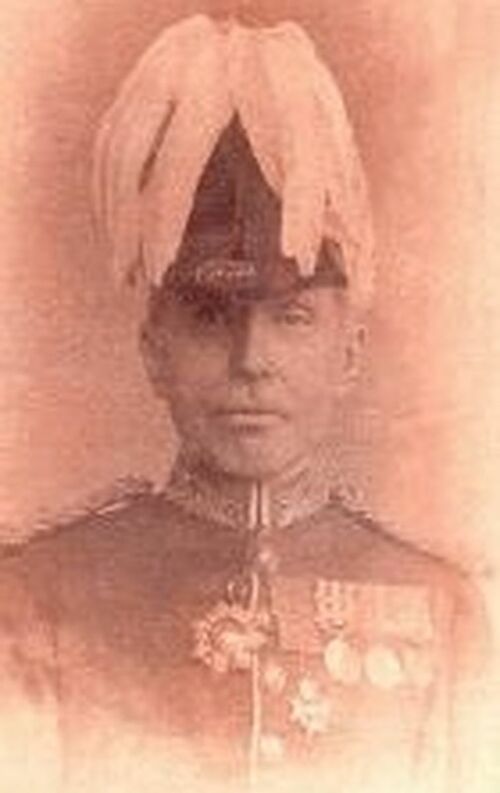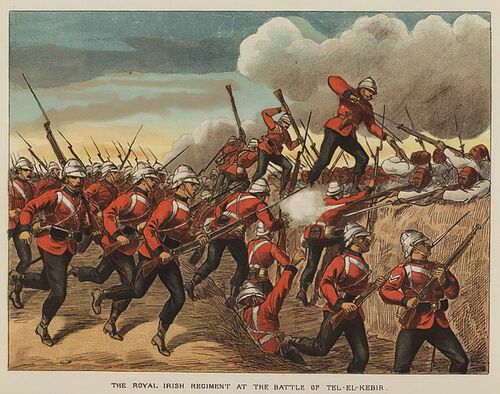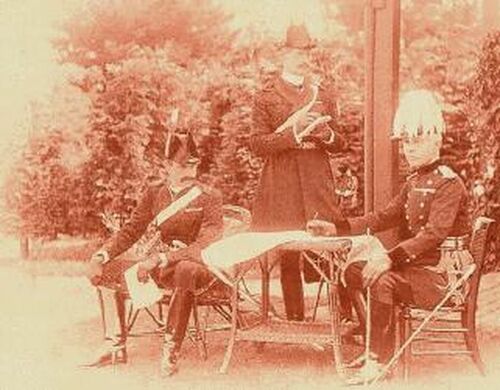Auction: 23003 - Orders, Decorations and Medals
Lot: 242
The outstanding 1882 Egypt operations C.B. and Order of Medjidie group of five awarded to Major-General C. F. Gregorie, Royal Irish Regiment, late Royal Welsh Fusiliers, who was additionally 'mentioned' in both the Indian Mutiny and Egyptian campaigns, who was Colonel-in-Chief of the Royal Irish Regiment
The Most Honourable Order of the Bath, Military Division, C.B., Companion's breast Badge, 18ct gold, hallmarks for 1873; Indian Mutiny 1857-59, 2 clasps, Lucknow, Relief of Lucknow (Adjt Chas F Gregorie, 1st Bn. 23rd R.W.Fusrs.); Egypt and Sudan 1882-89, dated reverse, 1 clasp, Tel-El-Kebir (Col: C. F. Gregorie. 2nd Bn Rl. I. Regt.); Turkey, Ottoman Empire, Order of Medjidie, Third Class neck Badge, gold, silver and enamel, by P. Stopin; Khedive's Star 1882, housed in a bespoke fitted case, some light enamel damage to the first and fourth, otherwise with light contact marks to the second and third, otherwise very fine or better (5)
C.B. London Gazette 18 November 1882.
M.I.D. London Gazette 31 January 1859 & 2 November 1882.
Charles Frederick Gregorie was born on 25 November 1834 at Westminster, London, the son of David William Gregorie and Eleanor St Barbe White. He was educated at Westminster School as a Queen’s Scholar. After leaving school in 1853, he worked as a clerk in the Post Office for two years.
He became an Ensign in the 23rd Regiment of Foot (Royal Welsh Fusiliers) on 12 February 1855 and was promoted to Lieutenant on 30 June 1855. He did not see active service in the Crime despite references to his serving there. Gregorie then served as Adjutant to the 23rd Foot between 2 May 1857-2 June 1859 and served with his regiment in the Indian Mutiny.
On 20 October 1859 he married Henrietta Amy Lawrence, who was the third daughter of George Lawrence of Moreton Court, Hereford, and over the course of their marriage, had issue of ten children.
Gregorie was promoted to Captain on 4 November 1859 and served in Malta for two years before returning to England. He was promoted to Major in the 18th (Royal Irish) Regiment of Foot on 31 October 1871, and made Brevet Lieutenant-Colonel on 24 November 1876 and Colonel (Army) on 1 July 1881.
In 1882 he served in the Egyptian Campaign, taking part in the battle of Tel-el-Kebir in September 1882 with the 1st Battalion, Royal Irish Fusiliers. The Fusiliers were involved in heavy action and sustained casualties including 2 men killed and 34 wounded. Thankfully some of his letters survive to paint a picture of his experiences. This first example was penned at Kassasin Lock on 5 September:
'My dearest, Your dear letter of the 18th Aug is still the only one that I have yet received. It was a very great comfort to me, and particularly the sentence that told me of your prayers and those of my precious darlings. In times of difficulty and hard work nothing encourages one so much as the hearty sympathy of my beloved ones — we are all indeed of one heart and one mind in our love for one another, and it smoothes and lightens every difficulty and makes every pleasure far more enjoyable. On the morning of the 3rd, Sunday, at 4.30 we marched from Mahutah, where the Head Quarters of the 1st Division of the Guards Brigade are still encamped to Mahsama, and there three companies under Major Toppin occupied and still occupy the railway station, and the remaining five companies bivouacked with me on the land about 500 yards from the station. As soon as the men had settled themselves, I rode on to the post to report myself to Lt.Gen. Graham who commands our Brigade and is now in charge of this, which is the most advanced post, and missed him, for he had gone back to look for me. So I hustled back to Mahsama and there found him. He is a very nice pleasant fellow, an Engineer with the Victoria Cross won as a Capt. in the Crimea. He arranged to have three Companies for the present under Toppin at the Station, and that I with the five should come on here yesterday afternoon, after visiting a village to clear it of mischievous Bedouins that were supposed to be there. This we did and found no one but peaceful villagers, who very soon proposed to open a market for the sale of poultry and water melons; poor wretches, they have had hard time of it lately with the Egyptian army living upon them, and them subject to the extortions of the rapacious Bedouins. We left Mahsama at about 4 in the afternoon, & the men marched along merrily past the Cavalry camp where Baker Russell is commanding a Brigade and arrived here yesterday afternoon at half past five. The force here has grown considerably since Monday the 28th when the 46th & 84th a few Marines and two guns which were very short of ammunition had something to do to beat off the Egyptian attack. There are now here the 46th, 84th, 50th, 60th and Marine battalion, ourselves, four batteries, and the Cavalry Brigade close behind us. We shall probably be here for the next five or six days until a sufficient force is assembled to make an irresistible advance. The men are getting much harder and better able to stand fatigue than at first, and are far quicker in providing for themselves. On Sunday when I got back from my ride I found them all under shelter from the sun, for they had found some old tents in a deserted Egyptian camp with which they had made excellent shelter. Father Brindle, our Chatham priest, is attached to this brigade, I am glad to say, for he is a very good man; he could not get out for a service on Sunday, for he had much to do here, but I read the prayers to the Ch. of England people in the evening. With my love to all believe me, my own darling.'
He wrote to his wife on the day of the Battle:
'My dearest, a very important advance has been made since I posted my letter to you yesterday. I have given Grant a telegram to send from Ismailia to tell you of our dear boy’s safety and mine, knowing well the anxiety you and my dearest Mother and all of you will be in for tidings of us, and being very anxious that you should be able to join with me in the warmest prayers that the lives that God has spared may be wholly given to His service. We struck our tents at Kassasin after sunset yesterday and paraded with the whole of the Infantry at 7 o’clock; it was a wonderful march in the dark, creeping along hardly able to distinguish the points on which we were directed to move. The idea was that we were to move, very silently onto the Enemy’s works at this place, which are strong, and rush at them with fixed bayonets and seize them on the first streaks of dawn without firing a shot. Considering the darkness of the night, for there was no moon, we were very cleverly piloted across the desert by the Staff, and day-break found us all in our places, but the Enemy was too much on their alert to be dealt with as Sir Garnet proposed, & as soon as they could see us they opened a smart fire. Then the only thing was to form in order of attack and rush straight at their parapets & this was done very promptly & well by every regiment on the ground. I am thankful to say that my boys were in no way behindhand. They were led very straight by all their officers, dear David like all the others well in advance, and after the action Gen. Graham came & shook me by the hand and congratulated me heartily on the Regiment’s performance!'
Two days after the action:
'My dearest, the enclosed telegram is from Sir Evelyn, and as soon as I received it this morning I assembled officers & men & read it out to them and you should have heard the shout with which they received it. It is very kind of him to have sent it, will you put it away among my papers. Sir Garnet & the Guards went yesterday to Cairo, and we hear this morning that Arabi has surrendered unconditionally, and now appears, thank God for it, the delightful prospect of a return to my darlings and to my beloved Mother and to pleasures that are to me far more enjoyable than any other the world can offer. The Cavalry & Highland Brigade have gone to Zagazig, and our Brigade, & some Artillery, are all that remain here. On this side of the canal where we are encamped the desert is as bare as we have passed through, but on the other side there is a stretch of quite fertile country with palms and millet crops and springs of water; they look very nice but I have not had time yet to go among them. I hear that Chichester got safely to Ismailia and is now probably on board ship & on his way to England; of the seventeen wounded non-commissioned officers & men I have been able to hear nothing at present, but from all I hear generally of the arrangements for the conveyance of the sick to Ismailia they seem to be very complete. Toppin came back to the regiment yesterday, but too ill to do anything and has again returned today to Ismailia. I think, & most sincerely hope & trust that Sir Garnet will allow no delay in re-embarking the greater part of this force. We shall probably have no more than three or four regiments to occupy Alexandria, and they will most likely be regiments that were in the Mediterranean before the war. Battalions such as this with many reserve men in the ranks will be sure to return to England. Believe me, my own darling!'
Gregorie reverted to Half Pay on 11 November 1882 and was presented with his Egypt Medal from the hands of Queen Victoria on 21 November 1882. He thence served in the Regimental District from 16 October 1883, and reverted to Half-Pay on the 17 November 1885, the same day where he became Assistant Adjutant-General of the South East District.
Gregorie was promoted Major-General on 18 June 1890 and was appointed Colonel-in-Chief of the Royal Irish Regiment and was eventually placed on the retired list on 12 December 1894. He died on 18 April 1918 at Denton House, Wokingham, Berkshire.
Subject to 20% VAT on Buyer’s Premium. For more information please view Terms and Conditions for Buyers.
Sold for
£4,000
Starting price
£3200











